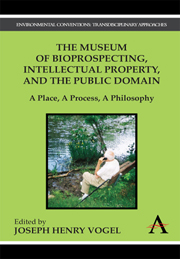 The Museum of Bioprospecting, Intellectual Property, and the Public Domain
The Museum of Bioprospecting, Intellectual Property, and the Public Domain Book contents
- Frontmatter
- Contents
- List of Figures
- Preface
- Acknowledgements
- Introduction: The Bauplan
- Chapter 1 Looking the Gorgon in the Face
- Chapter 2 Museums as Venues for Polemics
- Chapter 3 The Museum as a Vehicle for Considered Judgments on Access and Benefit Sharing
- Chapter 4 Clearing the Air: Applying the Intellectual Property Framework to National, Community, and Individual Rights in The Convention on Biological Diversity
- Chapter 5 The Anti-Commons Threat to Farmers' Rights: The Case of Crop Germplasm
- Chapter 6 The Moral Foundations of Intellectual Property and Conservation through Access and Benefit-Sharing
- Conclusions: The Nameless Interloper in The Museum of Bioprospecting, Intellectual Property, and the Public Domain
- Appendix: The Original Essay: A Proposal Based on “The Tragedy of the Commons:” Museum of Bioprospecting, Intellectual Property Rights, and the Public Domain
- Notes
- Index
Introduction: The Bauplan
Published online by Cambridge University Press: 05 March 2012
- Frontmatter
- Contents
- List of Figures
- Preface
- Acknowledgements
- Introduction: The Bauplan
- Chapter 1 Looking the Gorgon in the Face
- Chapter 2 Museums as Venues for Polemics
- Chapter 3 The Museum as a Vehicle for Considered Judgments on Access and Benefit Sharing
- Chapter 4 Clearing the Air: Applying the Intellectual Property Framework to National, Community, and Individual Rights in The Convention on Biological Diversity
- Chapter 5 The Anti-Commons Threat to Farmers' Rights: The Case of Crop Germplasm
- Chapter 6 The Moral Foundations of Intellectual Property and Conservation through Access and Benefit-Sharing
- Conclusions: The Nameless Interloper in The Museum of Bioprospecting, Intellectual Property, and the Public Domain
- Appendix: The Original Essay: A Proposal Based on “The Tragedy of the Commons:” Museum of Bioprospecting, Intellectual Property Rights, and the Public Domain
- Notes
- Index
Summary
E. O. Wilson emphasizes the importance of classification in a number of his writings. “The first step to wisdom, as the Chinese say, is getting things by their right names.” Such wisdom is not confined to Harvard entomologists and leaf-cutting ants. It can also be applied to civil society and education. In 1956, Benjamin Bloom conceptualized education as divisible into three domains: the cognitive, the affective, and the psychomotor. Each domain could be further broken down. The cognitive was a hierarchy of six distinct classes or levels. At the bottom is “knowledge,” associated with “remembering, either by recognition or recall, of ideas, material or phenomena” (62); at the top, “evaluation,” “the making of judgments about the value, for some purpose, of ideas, works, solutions, methods, material, etc” (185). From bottom to top, the mental levels are more challenging and the hierarchy can be conceived as a pyramid (Fig. I.1.). The seven contributors to this volume share the conviction that a “Museum of Bioprospecting, Intellectual Property, and the Public Domain” will enable the public to scale the cognitive pyramid while also delving into the domains of the affective and the psychomotor. Given the ignorance and misconceptions about bioprospecting, intellectual property, and the public domain, the ascent for most museum visitors will begin at the very bottom, viz., knowledge.
- Type
- Chapter
- Information
- The Museum of Bioprospecting, Intellectual Property, and the Public DomainA Place, A Process, A Philosophy, pp. xvii - xxxPublisher: Anthem PressPrint publication year: 2010


